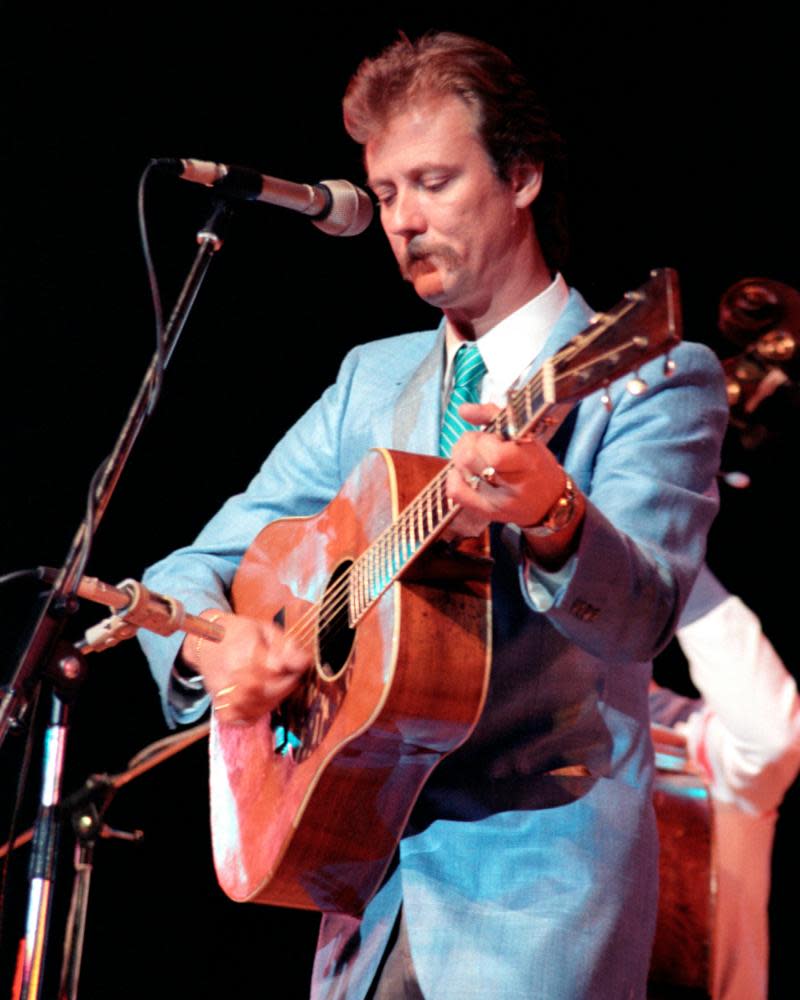Tony Rice obituary
In the second half of the 1970s a loose group of young American bluegrass musicians rewrote the prospectus of that somewhat hidebound idiom, introducing, often in untypical accents, uncanonical songs and unconventional ways of playing them. Ricky Skaggs, Sam Bush, Jerry Douglas, David Grisman and Tony Rice became crucial innovators in “newgrass” and “new acoustic music” – so effectively that Rice could reflect, years later, that “bluegrass is a term that means so much more now than it did”. He added, perhaps gently chiding conservative critics, that “as soon as you become a diehard anything, be it jazz or bluegrass or whatever, you’re depriving yourself of a whole world of music”.
Rice, who has died suddenly aged 69, was not only exceptionally gifted as a guitarist and singer, but he constantly refreshed the bluegrass repertoire, reshaping familiar material and inserting new songs by writers he admired, such as James Taylor, Ian Tyson, Joni Mitchell, Bob Dylan, Rodney Crowell and above all the Canadian songwriter Gordon Lightfoot. The singer Alison Krauss, talking to Dave Simpson in the Guardian, recalled: “When I was about 13, I was out of my mind for [Rice’s 1984 album] Cold on the Shoulder. He’d do songs by Lightfoot, or Jimmie Rodgers, and totally change them. The stories and poetry in all those songs were amazing. I daydreamed about playing fiddle in Tony’s band.”
Rice was born in Danville, Virginia, to Herbert Rice, an arc-welder from North Carolina, and his wife, Dorothy Poindexter. In the early 50s the family moved to Los Angeles, where Herbert, who played the mandolin and guitar, founded the Golden State Boys, one of the first bluegrass bands in southern California. Tony learned the guitar, made his radio debut on Town Hall Party at the age of nine, and began playing with his brothers Larry and Ronnie. They performed straight bluegrass – “old [Lester] Flatt and [Earl] Scruggs stuff: that was music that really got to me” – in California folk clubs such as the Ash Grove and the Troubadour, often sharing the stage with the Country Boys, featuring the phenomenal young guitarist Clarence White, whose Martin D-28 guitar Rice acquired after White’s untimely death in 1973.
In 1965 the Rices moved back east. After briefly working as an apprentice pipefitter, in 1970 Tony joined the band Bluegrass Alliance, where he met Bush. “Very few people at that time would open their ears to something else beyond old-time, down-to-earth bluegrass,” said Rice. “Sam and I got on good in that respect because we were tuning our ears into rock, jazz . . . whatever.”
In 1971 he moved to the banjo player JD Crowe’s group the New South, followed by Skaggs and Douglas. This was the hottest band in bluegrass, and their eponymous 1975 album was a landmark recording. From Crowe, Rice said, he learned “to play perfectly in time, to play with soul, to hit all the notes really clear and clean.” By that stage, in the judgment of the mandolinist Jack Tottle, Rice was blending “conventional flatpicking technique with crosspicking, and with harmonic intervals taken from jazz. His sense of timing was superb and his use of syncopation had become brilliantly original.”

Rice then returned to California to spend four years in the David Grisman Quintet, playing acoustic jazz-folk. “My heroes,” said Rice, “are in small ensemble modern jazz rather than bluegrass. I have derived most of my influences from there.” But his connection to the past remained strong, and the 1980 album Skaggs & Rice was a poignant tribute to old-time country music. “Ricky and Tony not only phrased together, they breathed together,” said Barry Poss, founder of Sugar Hill Records, which released the album. “It was a deceptively simple, absolutely elegant homage to the music they had grown up with and had just left for new musical horizons. And what they left us with was a masterpiece.”
In fact Rice never left bluegrass for long. A 1981 session with Crowe and the mandolinist Doyle Lawson produced The Bluegrass Album, which was so well received that they recorded five further collections of classic genre songs and tunes under the name of the Bluegrass Album Band.
By nature an ensemble player, Rice would nonetheless occasionally conceive a solo project, such as the album Church Street Blues (1983). Later there were collaborations with his fellow singer-guitarists Norman Blake and Peter Rowan, and contributions to albums by Emmylou Harris, Bela Fleck and Mary Chapin Carpenter. He was perhaps at his most confident in the studio, since he never felt himself to be a natural stage performer, and said he had to psych himself into not being such a perfectionist when playing live.
In any case he had to reconsider his way of working when, in the mid-90s, muscle tension dysphonia, a throat and vocal cord condition, rendered this most graceful of singers silent. Twenty years on he was diagnosed with tennis elbow, which made guitar playing impossible too. His last public performance was in 2013, when he was inducted into the Bluegrass Music Hall of Fame.
He is survived by his wife, Pamela (nee Hodges) and by his brothers Wyatt and Ron.
• David Anthony (Tony) Rice, musician, born 8 June 1951; died 25 December 2020

 Yahoo News
Yahoo News 
